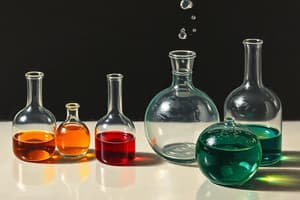Podcast
Questions and Answers
What type of solution absorbs heat during the process of dissolving?
What type of solution absorbs heat during the process of dissolving?
- Endothermic solution (correct)
- Concentrated solution
- Saturated solution
- Exothermic solution
Which statement accurately describes a compound?
Which statement accurately describes a compound?
- Consists of two or more substances combined physically
- Dissolves completely in a solvent
- Always appears in a solid form
- Has a fixed proportion and is chemically combined (correct)
What term describes a solution that has reached its maximum solute concentration?
What term describes a solution that has reached its maximum solute concentration?
- Unsaturated
- Supersaturated
- Saturated (correct)
- Dilute
Which of the following factors does NOT increase the rate of solubility?
Which of the following factors does NOT increase the rate of solubility?
Which of the following statements about suspensions is true?
Which of the following statements about suspensions is true?
Flashcards
Endothermic
Endothermic
A process that requires energy to proceed, often in the form of heat.
Exothermic
Exothermic
A process in which energy is released, commonly as heat.
Solute
Solute
A substance that dissolves into a solvent to form a solution.
Solvent
Solvent
Signup and view all the flashcards
Solubility
Solubility
Signup and view all the flashcards
Study Notes
Solutions
- Solutions involve supplying energy
- Endothermic solutions absorb heat
- Exothermic solutions release heat
Mixtures
- Mixtures are two or more substances that do not combine chemically
- Mixtures are combined physically
Compounds
- Compounds are chemically combined
- Compounds have a fixed proportion
Solutions (continued)
- Solutions are homogenous throughout
- Solutions can be made of solids, liquids, or gases
- Examples of solutions:
- Gaseous Solutions (e.g., air)
- Liquid Solutions (e.g., drinks)
- Solid solutions (e.g., alloys, steel, brass)
Solute
- The solute is the substance being dissolved
- It is the lesser component
Solvent
- The solvent is the substance that dissolves the solute
- It is the greater component
- Examples of solvents include water
Humidity
- Humidity is water dissolved in the air
Effervescence
- Effervescence is the escape of gas from a solution
Suspension
- Suspensions are identifiable by different parts
- Salt lowers the freezing point
Concentration
- Concentration is the amount of solute dissolved in a solvent at a specific temperature
Dilute
- Dilute solutions have a low concentration of solute
Concentrated
- Concentrated solutions have a high concentration of solute
Unsaturated Solution
- Unsaturated solutions have less than the maximum concentration of solute dissolved
Saturated Solution
- Saturated solutions have the maximum concentration of solute dissolved
Supersaturated Solution
- Supersaturated solutions contain more solute than is normally possible
- Solubility is the amount of substance that will dissolve in a certain amount of solvent at a given temperature
Factors Affecting Solubility
- Higher pressure increases the amount of gas that can be dissolved
- Temperature- Increased temperature makes substances dissolve faster
- Shaking - faster dissolving
- Particle size – smaller particles dissolve faster
Studying That Suits You
Use AI to generate personalized quizzes and flashcards to suit your learning preferences.




